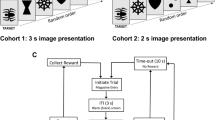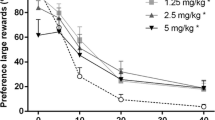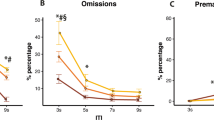Abstract
The effects of repeated intermittent administration of amphetamine (1, 2, 3 mg/kg, IP) on the performance of rats in a task designed to assess sustained attention were tested. A substantial increase in the number of false alarms (i.e., “claims” for hits in non-signal trials) was observed following subsequent administrations of amphetamine. This effect could not be accounted for by drug-induced side or position biases, switching behavior or stereotypy. The effects of repeated amphetamine may model some of the cognitive processes which mediate the attribution of incentive salience to stimuli associated with repeated psychostimulant administration and the development of psychostimulant-induced psychotic symptoms.
Similar content being viewed by others
Author information
Authors and Affiliations
Additional information
Received: 28 January 1998/Final version: 17 March 1998
Rights and permissions
About this article
Cite this article
Deller, T., Sarter, M. Effects of repeated administration of amphetamine on behavioral vigilance: evidence for “sensitized” attentional impairments. Psychopharmacology 137, 410–414 (1998). https://doi.org/10.1007/s002130050637
Issue Date:
DOI: https://doi.org/10.1007/s002130050637




